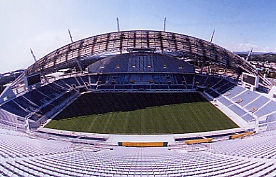 |
| Posters | Videos | CD-ROMS | Games | Soccer Mags | Books | Products! |
 |
| SEOGWIPO |
| Honeymoon Capital of JeJu
Island |
Seogwipo is a tourist resort on the south coast of Jeju, Korea's largest island and its premier tourist destination. Over 3.7 million tourists visit the island every year to enjoy the mild, sub-tropical climate, first-class resort facilities beautiful beaches and spectacular waterfalls.
Rising from the centre of the island is Mount Halla which, at 1,950 metres, is one of the highest peaks in Korea. With a spectacular crater lake at the summit, this dormant volcano is a favourite destination for Korea's legion of weekend hikers. Mount Halla was active up until the eleventh century, and Jeju is dotted with "parasitic cones" which were thrust up by volcanic activity related to Mount Halla.
Volcanic activity has played a major role in shaping Jeju, a fact that is graphically demonstrated by the island's distinctive dol-harubang - literally "stone grandfathers." These statues, carved out of porous volcanic rock, are a Korean mystery. Only 47 exist and no-one knows who carved them or why. Nevertheless, today the dol-harubang is one of the most recognisable symbols of Korea.
Jeju is also famous for its production of succulent mandarin oranges and for the women divers - many of them more than sixty years old - who collect marine products from the sea bed without the aid of breathing apparatus.
Before international travel became popular in the early 1990s, practically everyone went to Jeju for their honeymoon. A significant number of young Koreans continue to choose to spend their first few days as a married couple enjoying the beautiful countryside and romantic sunsets of the island that has become known as he honeymoon capital of Korea.
Surprisingly in such a densely populated country, Jeju has only around 500,000 inhabitants, of whom less than 100,000 live in Seogwipo, making this the smallest of Korea's FIFA World CupTM venue cities.
Despite its small population, however, Jeju has more than 270 active football clubs, making football one of Jeju's favourite past-times.
Information
Website: www.2002seogwipo.com
Tel: 82-64-735-3544
Fax: 82-64-735-3541
| JEJU WORLD CUP STADIUM |
 |
| The football-only stadium is carefully harmonised with its natural surroundings. The stadium is designed to symbolise one of Jeju's many secondary volcanoes while the roof represents a net flung from a fishing boat. |
| Key Facts Name: Jeju World Cup Stadium Type: Football Only To Open: December 9 2001 Cost: W112.5 billion Total Capacity: 42,256 Spectator seats: Under cover: 20,266 Open: 21,128 VIP seats: 526 VIP Boxes: 0 Disabled seats: 168 Assistant seats: 168 |
| Pitch Size: 117m x 78m Spectator Parking: 657 Distances to Stadium From city centre: 4 km From Jeju International Airport: 45 km From Jeju Seaport: 49 km From Jeju bus terminal: 46 km From Seogwipo bus terminal: 4 km Press Facilities Press seats: 200 Seats with desk and telephone: 400 Space for commentators: 600 Space for photographers: 100 |
Source: FIFA
 |
 |
 |
 |
 |
 |
| Videos | New Posters | CALENDARS | Books | Magazines |
| VISIT THE WORLD'S LEADING SOCCER MAGAZINE |
| Posters | Videos | Books | Games | Mags | New Products |
| MAIN LINKS** CLUBS (Intl.) COUNTRIES PLAYERS WOMEN YOUTH COLLEGE HIGH SCHOOL SOCCERMALL |
 |
|